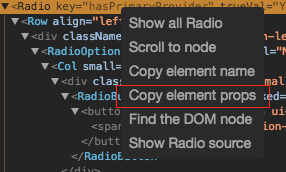Jest Testing patterns in React-Redux applications
17 Nov 2017- Jest provides a complete ecosystem for testing. There is no need of extra libraries - Mocha, Sinon, Istanbul, Chai, proxyquire etc. as all are present in Jest itself.
Basic Setup Configurations
-
testMatch: The glob patterns Jest uses to detect test files. By default it looks for .js and .jsx files inside of tests folders, as well as any files with a suffix of .test or .spec (e.g. Component.test.js or Component.spec.js). It will also find files called test.js or spec.js. -
setupTestFrameworkScriptFile: E.g. If you are using EnzymeV2 and React v16, then the configuration of adapter can happen here. https://github.com/airbnb/enzyme/blob/master/docs/installation/README.md`"setupTestFrameworkScriptFile": "./src/app/utils/setup-tests.js"`And inside that we will have the below code. Make sure you install
enzyme-adapter-react-16// setup file import { configure } from 'enzyme' import Adapter from 'enzyme-adapter-react-16' configure({ adapter: new Adapter() }) -
setupFiles -
coverageReporters: Default: [“json”, “lcov”, “text”]"jest": { "collectCoverage": true, "setupTestFrameworkScriptFile": "./setupTests.js", "setupFiles": [ "./setup.js" ], "testPathIgnorePatterns": [ "./node_modules/", "./build/" ] }
Patterns
Below are the different patterns of using Jest in a typical React - Redux application.
Snapshot testing of React Components
Snapshot testing is an assertion and not just limited to testing react components. It doesn’t really follow TDD.
const component = renderer.create(
<LoginForm {...props} />
);
let tree = component.toJSON();
expect(tree).toMatchSnapshot();
If you are using enzyme, you can use shallow/mount method for snapshot testing as well with enzyme-to-json.
import toJson from 'enzyme-to-json'
const component = shallow(<LoginForm {...props} />)
expect(toJson(component)).toMatchSnapshot()
One of the most easiest way to set props for the component you need to test is by using the React chrome plugin. It has this super cool way to copy props and it’s saved to your clipboard as a json which you can then paste in your test file.

Redux Stores (HOC/Connected Components)
Mock store for your testing your redux async action creators and middleware with redux-mock-store.
import configureStore from 'redux-mock-store'
const middlewares = [thunk]
const mockStore = configureStore(middlewares)
<Provider store={mockStore({login: {userid: ''}})}>
<Login actions={loginActions} />
</Provider>
Action & Reducer Snapshot testing
I have mostly seen Jest being used to test React components. However, Jest makes it simpler to test even your actions and reducers as it’s basically an assertion.
Usually, developers do a console.log to find out the result and then use that as the assertion by pasting the result. Instead of that, you can just do toMatchSnapshot() and Jest will store the result in snapshot file.
We should always take a look at the snapshot to verify whether the results are correct. As always, the Jest snapshots should also be committed in the repo.
it('should handle GET_POST_START', () => {
const addAction = {
type: actions.ADD_TASK,
payload: 'Task 1'
};
expect(reducer(initialState, addAction)).toMatchSnapshot()
});
Events
With Jest you can test your app state before and after the event.
it('should render Markdown in preview mode', () => {
const wrapper = shallow(
<Login {...props} />
);
expect(wrapper).toMatchSnapshot();
wrapper.find('[name="show-password"]').simulate('click');
expect(wrapper).toMatchSnapshot();
});
Event Handlers (Enzyme + Jest)
In some of the cases, using Jest along with Enzyme gives you complete access to manipulating the DOM elements and then verifying the components with spying & mock functions.
const mockCallback = jest.fn()
const wrapper = shallow(<TextInput onChange={mockCallback} />)
wrapper.find('input').simulate('change', {target: {value: 'xyz'}})
expect(onChange).toBeCalledWith(value)
API calls in Redux actions
In cases where we trigger API calls in Redux action creators, we can use fetch-mock to mock the status and response.
it('Password change failure - Locked', () => {
fetchMock
.post(CHANGE_PASSWORD_URL, { status: 423, body: 'locked' })
.catch(503)
const store = mockStore({
password: {
oldPassword: {
value: 'nmc12345',
isValid: true
},
newPassword: {
value: 'abc12345',
isValid: true
}
}
})
const expectedAction = [
{ type: 'CHANGE_PASSWORD', meta: undefined },
{
type: 'ACCOUNT_LOCKED',
payload: {
message: `The password you've entered is incorrect. For your security, we're automatically logging you out of your account. Please try again at least two hours later.`
},
meta: {
analytics: {
type: 'ACCOUNT_LOCKED',
payload: {
message: 'Locked, error.. account locked'
}
}
}
}
]
store.dispatch(actions.validateAndChangePassword()).then(() => {
expect(store.getActions()).toEqual(expectedAction)
})
})
Jest Spying functions
There is no need of sinon any more as Jest provides a way for spying.
const editSpy = jest.spyOn(wrapper.props().children.props.actions, 'updateEditMode')
wrapper.find('span.icon-sysicon-edit').simulate('click')
expect(editSpy).toHaveBeenCalled()
Using Jest for Node Microservices
If you have Proxyquire in your test cases, Jest is not compatible with that. Jest recommends using their own mocking library :)
https://github.com/thlorenz/proxyquire/issues/152#issuecomment-273854086 https://github.com/facebook/jest/issues/1937
Converting proxyquire mocks to Jest mocks
Jest as a testing platform
jest-validate: Generic config validation tool https://github.com/facebook/jest/tree/master/packages/jest-validatepretty-format: Stringify any JS value. Almost similar toJSON.stringify. Faster and no circular reference issue.prettieruses it
Debugging jest
You can use node --inspect to debug your Jest cases.
test:debug: "node --inspect-brk node_modules/.bin/jest --watch"
Editor setup
When you write test cases, you would often see errors and warnings related to jest keywords (it, expect) when you have Standard plugin installed in your editor. One way to mitigate this is by adding the env keyword to your standard configuration and set it to jest. With that done, you would no more see the warnings and errors related to Jest.
"standard": {
"ignore": [
"/src/app/Validator/lib/*"
],
"env": [ "jest" ]
}